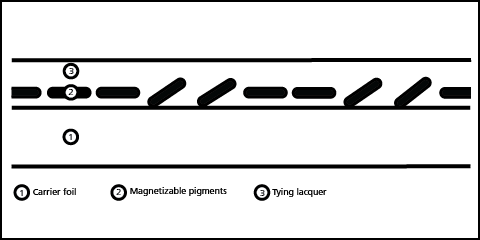
The bare structure of magnetic tapes is always the same. They consist of a long synthetic tape, on which a coating of magnetizable pigments was put on. You can imagine these pigments as little needles. They have a size between 0.1 and 1 µm and are laid on with a thickness of 10µm onto the synthetic tape [9]. It´s important, that the pigments are coated very evenly, because surface irregularities or clusters of these pigments can cause problems while writing or reading later on. The pigments are most often iron oxide crystals, but sometimes chromic oxide is used instead of. Synthetic is favorable for the base because it´s much more tear-resistant as for example paper. Anyhow it has a great resiliency, because it´s very thin (rarely thicker then 15µm). Today the pigments don´t have to be coated on the carrier foil with a tying lacquer and can be vacuum-metalized instead [9]. The finished tapes are mostly stored in hubs, which are mentioned “bobbies”, or in cassettes.